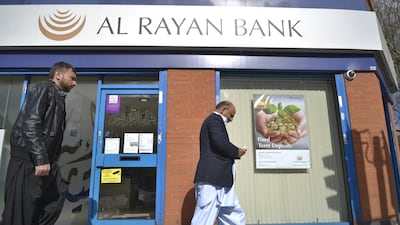UK officials are calling for an inquiry into a British Qatar controlled bank which has been acting as a platform for Islamists’ interests in Europe.
The British-registered, Qatari state controlled bank, Al Rayan, has come under scrutiny after revelations that at least 15 controversial entities – four of which have had their UK accounts closed by leading banks including HSBC and Barclays – operated with accounts on its books.
It’s client list includes groups accused of links to extremists and Islamists agendas from Hamas to the Muslim Brotherhood.
Dr Paul Stott, Research Fellow at the Henry Jackson Society, told The National: “Al Rayan has been operating in plain sight for years.
“The authorities knew or should have known about its ownership and activities but were powerless to act. The time has come for the UK to have a serious political debate about the role Qatari-backed groups are playing in our society.”
Zac Goldsmith, a leading Conservative MP, said he would be urgently raising the issue with the home secretary Priti Patel.
“If it [Qatar] is also using its considerable wealth and global reach to facilitate extremism here in the UK, then the government needs to act quickly and decisively,” he said.
The bank’s clients include Finsbury Park mosque, which was formerly run by hate cleric Abu Hamza who is serving a life sentence for terror offences in the US, and had its account closed by HSBC in 2014.
It has been listed as being associated with terrorism on the banking system World-Check which institutions use when deciding on clients and their risk.
The Nectar Trust, the British arm of the Qatar Charity in Doha which is banned by a number of countries including the UAE, is a customer.
The Qatar Charity, which has been connected with the Muslim Brotherhood and designated a proscribed organisation within the Arab Quartet for its links to terrorism, handed the Nectar Trust £28.2m between 2017-2018.
It is behind a number of projects to build some of the largest multi-million-pound mosques across Europe.
It gave £2.2m to the Emaan Trust in Sheffield to build one of the UK’s largest mosques. The project has also been steeped in controversy after it was revealed the construction was being overseen by a Kuwaiti official who claimed Jews orchestrated the September 11, 2001 attacks and that board members of the group had criminal records.
A trustee of the Emaan Trust, Ahmed Al-Rawi, is the former president of the Federation of Islamic Organisations, believed to be the European arm of the Muslim Brotherhood.
The Ummah Welfare Trust, which has worked with organisations in Gaza that are banned in the US for funding Hamas, is a client, it was previously dropped by HSBC as a customer.
Palestinian aid charity Interpal, which was identified in a UK government report as having links to the Muslim Brotherhood, has been banned in the US over alleged funding links to Hamas. It has previously had its Lloyds TSB and Natwest bank accounts closed.
On Monday, the UK’s financial watchdog the Financial Conduct Authority refused to confirm whether or not it was investigating Al Rayan.
The client list was uncovered as part of research carried out jointly by think-tank the Henry Jackson Society and the UK’s Times newspaper.
It also discovered that a former chief executive at the bank, Sultan Choudhury, was an unpaid director of international religious organisation the AlKauthar Institute which has hosted controversial speakers, including one man who said female circumcision is as natural as clipping fingernails.
The bank, which is headquartered in Birmingham, is meeting all its legal and regulatory requirements and the clients are lawfully entitled to operate in the UK.
Under its counter-terrorism laws, the UK has the power to freeze accounts it believes are linked to terrorism.
The accounts of these organisations are still active and operating within the law.
However, a former British diplomat Sir John Jenkins has raised concerns and has accused Qatar of “systematically promoting Islamist causes, including in the UK”. Sir John wrote a 2015 report for the government on the role of the Muslim Brotherhood in Britain which examined its influence over a wide array of charities and other organisations.
The bank said it cannot discuss individual clients but that it “only provides banking services to entities that are authorised to operate” in Britain.
It said: “Al Rayan has been operating in the UK since 2004 and serves individuals, businesses and charities of all faiths and none. It does not support any organisation or event that promotes extremist or violent views or ideologies.”
Al Rayan, which is regulated by the Financial Conduct Authority, is the oldest and largest Islamic bank in the UK with more than 85,000 customers and has an asset book in excess of £2.05bn.
Last month it was recognised in the sixth edition of London Stock Exchange Group’s 1000 Companies to Inspire Britain report.
Under the Money Laundering, Terrorist Financing and Transfer of Funds Regulations 2017 there is an onus on banks to exercise appropriate due diligence in deciding on clients or face multi-million pound fines.
In 2017 the Financial Conduct Authority (FCA) fined Deutsche Bank AG £163m for failing to maintain adequate anti-money laundering systems.


